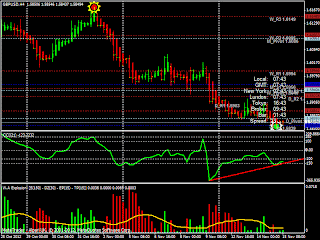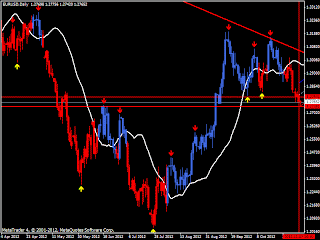Dollar Rallies as Fiscal Cliff Concerns Return
The U.S. dollar traded higher against all of the major currencies today as concerns about the Fiscal Cliff return. Throughout the past week, investors were hopefully that there would be a last minute deal to spare the U.S. economy from falling off the cliff. While this remains a possibility, the outlook is grim following Senate Majority Leader Harry Reid’s comment that “little progress has been made.” With less than 5 weeks to go before the end of the year, Congress is running out of time. Yet everyone knows that the stakes are high and while a comprehensive plan to avert the fiscal cliff is not likely, a partial deal that would give lawmakers breathing room to discuss broader reforms in the New Year is still possible. Some areas of agreement include closing loopholes, limiting tax deductions and extending tax cuts for middle and lower income earnings.
The Federal Reserve’s Beige Book report is scheduled for release tomorrow along with new home sales. Given the dovish FOMC minutes, we don’t expect much optimism from the Fed. However there are signs of improvement – according to the Conference Board, consumer optimism rose to its highest level in 4 years in the month of November. This improvement was a big surprise since the sharp sell-off in stocks between mid October and November caused other sentiment indicators such as the IBD and UMich surveys to decline. The increase in confidence bodes well for the holiday shopping season because it suggests that consumers are not that worried about the Fiscal Cliff. With Black Friday sales hitting record levels this year and spending on Cyber Monday rising more than 25% from 2011, the fiscal cliff isn’t causing any pangs of fear for consumers. Stronger demand was also seen in durable goods. While the headline number showed durable goods unchanged last month, if we exclude a decrease in transportation orders, demand for products made to last for a few years rose 1.5%. House prices also increased 0.39% according to S&P/Case-Schiller and 0.2% according to the Federal Housing Finance Agency. This softer pace of growth is consistent with the slow improvements seen in the housing market. Aside from the better than expected U.S. data, the rally in the dollar was also fueled by hawkish comments from Fed President Fisher who spoke in Berlin this morning. Fisher called for setting limits on asset purchases and said he believes there isn’t a need for the Fed to do more. As a non-voting member of the FOMC this year, his views have a limited impact on monetary policy.
EUR: Greek Deal Brings No Excitement
The euro ended the day slightly lower against the U.S. dollar in what can be best described as a classic buy the rumor sell the news type of reaction. Euro area finance ministers finally reached a deal on Greece, removing the immediate risk of a default. Unfortunately it is but one band-aid for a very big wound that resolves only a near term problem for the euro and not the region’s broader sovereign debt crisis. Spain could still knock on the bailout window next year and Greece could return to the negotiating table 6-12 months from now. As our colleague Boris Schlossberg pointed out, “Greece will receive 43.7 Billion euro in a series of stages from the Troika. The IMF share will be paid out all at once, once a buy back of Greek debt has occurred in the coming weeks. The ECB will hand back 11 Billion in profits it made on its sovereign debt holdings of Greek bonds and the EU will provide additional financing with the goal of reducing Greek debt to GDP ratio to 124% by 2020. The lenders also sought to cut interest rates for Greece and extend the maturity by 15 years to 30 years overall granting Athens 10 years of interest deferral. The parties also agreed to cut rates on the already extended bilateral loans from 150bps above cost to 50bps above cost once Greece achieves a 4.5% primary surplus.” Looking ahead, we don’t expect German consumer prices to have much impact on the euro. Import prices declined last month for the second month in a row and this suggests that CPI will slide as well. While today’s sell-off is not significant enough to negate the uptrend in the euro, the currency could remain under pressure from concerns about the U.S. fiscal cliff.
GBP: BoC Head Carney to become New BoE Chief
The British pound ended the day virtually unchanged against the U.S. dollar but slightly higher against the euro. The second release of U.K. GDP played second fiddle to the big story that broke headlines on Monday. To everyone’s surprise, U.K. Chancellor Osborne named Bank of Canada Governor Carney as the new head of the Bank of England starting July 1st, the day after Mervyn King steps down. As far as the market had known, Carney was not even a contender for the BoE post but this would not be the first time that the U.K. government appointed a foreigner to a key policymaking role. Americans Adam Posen (who stepped down in August) and Deanne Julius have served as members of the monetary policy committee. Carney is also married to a Brit with 4 daughters with dual citizenship. The Bank of England has been forced to look beyond their own borders for candidates after a series of trading scandals dented the credibility of U.K. policymakers. As head of the Bank of Canada since 2008, Carney has extensive experience, is well respected internationally and has a done a good job of steering Canada’s economy through the financial crisis. He is said to be tough on banks, calling for higher capital requirements and tighter processes, flexible on inflation targeting and monetary policy. Yet Carney’s job won’t be easy because the U.K. economy is not only larger than Canada’s but it also faces deeper and more challenging problems. There were no revisions in the second release of U.K. GDP. The latest report confirmed that the economy rose out of recession in Q3 by growing 1%.
NZD: Strong Currency is Curtailing Export Demand
The Australian, New Zealand and Canadian dollars ended the day slightly lower against the greenback. New Zealand was the only country to release any meaningful economic data overnight and according to the report, conditions in the economy did not improve as much as economists had anticipated. The country’s trade deficit narrowed to -718M from -775M. Economists had forecasted a much smaller -450M trade gap but a strong currency and falling milk and butter prices weighed on exports. While exports and imports increased in October, the 12 month trade gap swelled to its largest amount in nearly 3 years. For the Reserve Bank of New Zealand, the lack of improvement in trade activity supports the case for more easing. This weekend’s NY Times had a lengthy article on New Zealand’s economy and the Prime Minister’s bet on Hollywood. The article talks about how Prime Minister Key is betting that filmmaking will help revive New Zealand’s economy through job growth and tourism. However beyond Peter Jackson’s “The Hobbit,” it is not clear if other filmmakers will be as attracted to making movies in New Zealand, especially now that the currency appreciated in value. With no major economic reports scheduled for release from the 3 commodity production countries, their currencies will take their cue from equities.
JPY: Weak Data Highlights Strains in Japan’s Economy
The Japanese Yen traded lower against all of the major currencies with the exception of the euro and Swiss Franc. There were only 2 pieces of Japanese data released overnight, which was the corporate service price index and small business confidence. Both measures support the case for further easing from the Bank of Japan. According to the corporate service price index, deflationary pressures exacerbated last month with prices falling the most in 8 months on a year over year basis. Small business confidence also slipped to its lowest level since July 2011. As we previously pointed out, Japan’s economy is deteriorating rapidly and we expect this week’s retail trade report to show further weakness. While economists are looking forward to a rebound in spending, rising bankruptcies and a decline in confidence could curb spending. It is widely believed that Japan’s economy returned to recession in the fourth quarter and a further drop in retail trade would need to occur for that to happen.

































